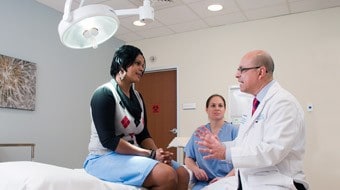Need to Know
- You will have blood drawn before the procedure to test how well your blood clots and to evaluate your kidney and liver function
- Do not eat or drink anything at least eight hours before the procedure
- If you take blood thinners, talk to your doctor beforehand about adjusting or stopping this medication
- Do not take aspirin or other pain relievers, such as Ibuprofen, for five days before the procedure
- If you have diabetes, ask your primary care doctor about adjusting your insulin dose
- Tell your technologist about any allergies, especially to local or general anesthetics and contrast materials (“x-ray dye”)
- Inform your technologist if you are pregnant
Nice to Know
- Before your procedure, you’ll meet with your Jefferson Radiology physician for a consultation
- Wear comfortable, loose-fitting clothing
- You’ll be given a gown to wear during your treatment
- You’ll be awake during the procedure and most-likely can go home after
- No surgical incision is needed, just a small nick in the skin
- You may feel some discomfort after the procedure, but no serious pain
Frequently Asked Questions
How Does Vena Cava Filter Retrieval Work?
Using fluoroscopy image-guidance (a form of X-ray imaging that allows doctors to see motion in real time), a catheter is placed in a blood vessel in the groin or neck. Through the catheter, a filter is placed into the Inferior Vena Cava.
What Happens Before, During, And After Vena Cava Filter Retrieval?
When you arrive for your procedure a nurse will greet you and let the team know you’ve arrived. You will be brought into an exam room and asked to change into a gown. Your doctor will greet you, explain the procedure and answer any questions you may have.
You will lie on an exam table for the procedure. The technologist or nurse will connect monitors for your heart rate, blood pressure, and pulse, and an intravenous (IV) line will be inserted into a vein in your hand or arm. This will be used to give you sedatives during the procedure.
The technologist will shave, sterilize, and cover the area of your body where a catheter will be inserted (usually either your neck or groin) with a surgical drape. The area will then be numbed using a local anesthetic. You may feel a tiny pinch when the anesthesia is administered. The doctor will make a very small nick in your skin, and you may feel some pressure as the catheter is inserted, but you won’t feel any serious discomfort. Using image-guidance, the catheter will be directed to the vein. You may feel some additional pressure as the catheter is put in place.
Contrast material (also called X-ray dye) is then injected to guide the catheter and locate the filter in the inferior vena cava. You may feel a warm sensation when the contrast material is injected. Once the filter is located, it is fed back through the catheter and removed. Once the filter is out, the catheter will be removed and pressure will be applied to the wound to stop any bleeding. You will not require any stitches. Your IV line will be removed and you will be taken to a recovery area to rest. The procedure can usually be completed within one hour.
Once you have recovered and feel ready you will be able to go home. You may feel some swelling or discomfort at the site where the catheter was inserted but this can usually be resolved with over-the-counter pain medication. Please discuss this with your doctor.
Your doctor will discuss with you any limitations to your daily activity following the procedure.
How Should I Prepare For Vena Cava Filter Retrieval?
There are things you can do to make your experience more comfortable, and many of these will depend on your individual preferences. You might like to keep a list of questions or — as you’re doing now — educate yourself about the procedure.
Some other things to keep in mind in planning for this procedure include:
- You should plan to have someone take you home after the procedure as you will not be able to drive after being sedated.
- You should wear loose, comfortable clothing to the procedure.
- Your doctor may ask you to stop taking aspirin, non-steroidal anti-inflammatory drugs (NSAIDS), or blood thinners (such as Coumadin or warfarin) for a time before the procedure.
- The day before the procedure (or the Friday before, if you’re scheduled for a Monday procedure), a nurse from the Interventional Radiology Department will call you. The nurse will give you any additional instructions, and will ask if you have any questions.
- When you arrive, make sure the nurse and radiologist know about any allergies you may have, especially allergies to local anesthetics (such as lidocaine), general anesthetics (such as propofol), or X-ray dye (contrast media). If there’s any chance you may be pregnant, tell your radiologist.
What Should I Bring To Vena Cava Filter Retrieval?
On the day of your procedure you should:
- Wear comfortable, loose-fitting clothes
- Wear comfortable shoes
- Avoid bringing jewelry or valuable
What Are The Benefits And Risks Of Vena Cava Filter Retrieval?
The benefits of removing a filter from the Inferior Vena Cava could be:
- There are several risks associated with having a filter in place. When the filter is removed because it is no longer needed, these risks are eliminated.
- This is a minimally invasive, non-surgical procedure to remove the filter. Most patients can resume normal activities with a day or two.
Some risks that you should be aware of include:
- As with any procedure that involves a catheter placed inside a blood vessel there is potential for damage to the blood vessel, bruising or bleeding at the puncture site, and infection.
- Slight risk of allergic reaction to the contrast material used.
- There is a risk that the filter can come loose during the removal and cause damage to blood vessels or nearby organs.
- There is a chance that the filter will not be able to be retrieved/removed.
Keep in mind that this information is general. Your radiologist is the best source of information about how these risks and benefits may apply to you.
Locations
Farmington Imaging Center
399 Farmington AvenueFarmington, CT 06032
Monday - Friday | 8:00am - 4:15pm
Weeknight and weekend appointments available for MRI
Weeknight appointments available for Mammography
Hours vary by examMore Information

 This procedure is done to remove a filter when it is no longer needed. Using image-guidance, doctors place a catheter (a long, thin tube) into a blood vessel and remove the filter from the Inferior Vena Cava(the large vein that carries blood to the heart.)
This procedure is done to remove a filter when it is no longer needed. Using image-guidance, doctors place a catheter (a long, thin tube) into a blood vessel and remove the filter from the Inferior Vena Cava(the large vein that carries blood to the heart.)





